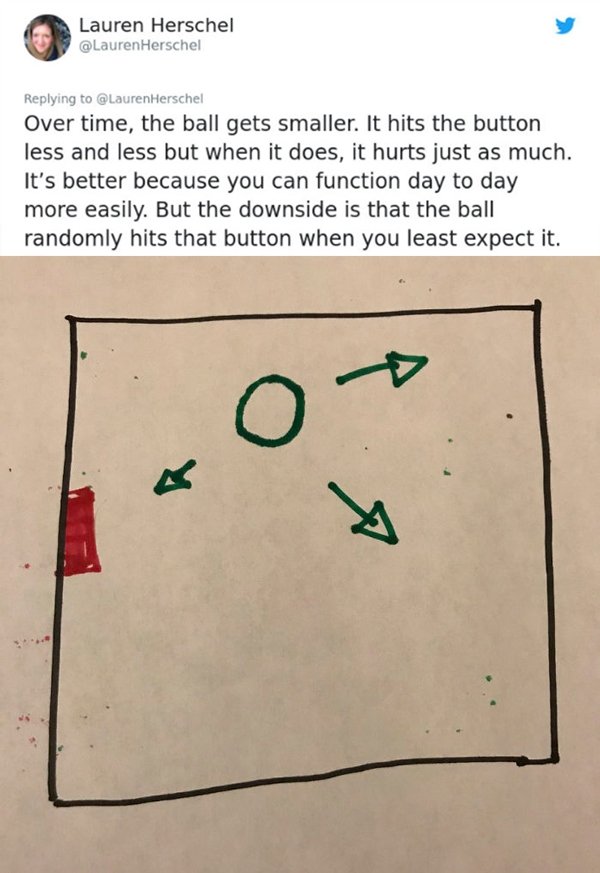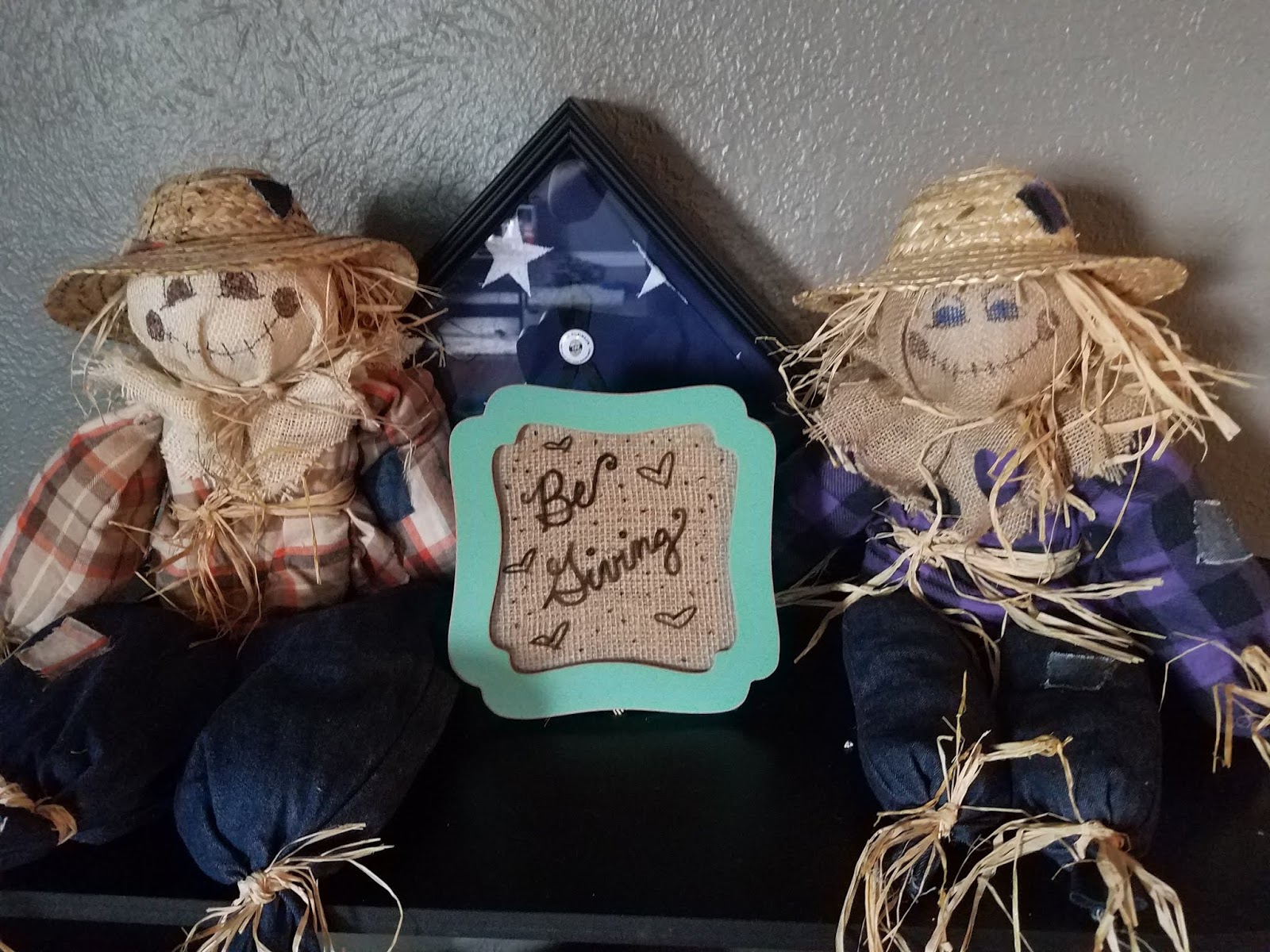On Instagram lately there have been a number of posts from a wide variety of people and entities on mental health awareness and how it’s ok to talk about how you are feeling and to focus on selfcare. I am happy that this is out there and that there are so many crafters that are open and willing to talk about how their craft has helped them deal with Anxiety, or Depression or OCD. I want to add another layer to that conversation and I will be sharing some personal experiences as well.
One thing that is not talked about and is more taboo, at least it seems like it lately, than mental health conditions is talking about grief and its profound and substantial impact it has on people. There is that image going around about grief being like a ball in a box with a button (See below), which I agree accurately explains how grief reactions feel but it’s not the whole picture. There are books, but some are way too sappy/sad, and other blogs (some of which are worth a read), but none I felt accurately said what I feel needs said. So with that I plan on this being the first post in a series about grief, coping, and how you can help others cope.
Grief can be caused by a number of things, mainly the loss of a loved one, the loss of a job, the loss of a relationship, the loss of a pet. Grief can also effect people in a huge number of ways from depression and sadness, to causing anxiety, to insomnia or oversleeping and eating disorders (I personally was told I had Post Traumatic Reaction Syndrome). Grief doesn’t just go away, and there’s no cure. You can’t bring someone back.
Going through this personally has been an eye opening experience. I lost my mom a little over 7 months ago. (I am 28, my older sister is 31, my younger sister is 25, and my brother is 22, so we are quite young to lose a parent). She was taken from us in a senseless act of violence for just doing her job as a civil law enforcement officer (they are un-armed). The act also involved arson and animal cruelty. The perpetrator was caught, and thankfully pled guilty, and is currently awaiting sentencing to life in prison without the possibility of parole.
No one knew really how to act around us, many still don’t. People brought us food, the city she worked for helped us plan the funeral, but that help only lasted about a week. Since then when we have run into people, they tell us how sorry they are, and usually tell us it’s ok to be sad, and then just just stare at us awkwardly, or they tell us unbelievable stories about what they heard/saw/gossiped about what happened. We’ve had people ask us how we’ve coped so well, some will ask us if we miss her, most just hmmm and uhhhh at us. I am here to tell you those things just really aren’t that helpful.
Loss happens. Grief happens. If someone you know has lost someone, the last thing they want to hear is it’s ok to be sad. They know that. Also asking if the miss the person, pet, or whatever is just silly, of course they do. Also, they know you are sorry, if it helps you to say it, ok, but as a grieving person, there really doesn’t seem to be a decent response to that. My responses to that have varied from thank you (but it feels odd to thank someone for being sorry I lost someone), and ya I’m sorry too (that was given in a moment of sarcasm to a close friend). Do not tell the person things like: it’s god’s will; they are in a better place; you should move on or how have you moved on so quickly, or anything along those lines.
And this is very important, if someone has lost a person to violence, crime, an accident, DO NOT tell them what you heard/saw/watched on the news or YouTube, they know the story more profoundly then they will ever be able to talk about or express and more details than what will ever be made public. Gossip and witnesses wanting their own 15 minutes of fame help nothing, and telling the person about it only makes them hurt and angry. My thoughts here are from my own experiences, the experiences of my siblings, and recent events regarding the Trooper in Montana recently severely injured in the line of duty, whose wife and captain had to release a statement to that effect. No family should ever have to issue a statement like this, ever.
Also, DO NOT tell the person how would feel; what you would be doing; how you would react; what could have, should have, may have been done to prevent such a thing. Believe me, if the loss is do to some crime, act of violence, or accident, the person has already gone over every scenario in their own head, and they don’t need to re-live it or need your opinion, nothing can change what happened, it did happen, and playing what I call the “what ifs” isn’t going to change that, and it just hurts.
Grief and the Grieving process shouldn’t be awkward or taboo; don’t avoid someone you know that is grieving. Although you think they may need time alone, they also may need a friend to lean on, or someone to go do things with. Try asking how are you doing today (but not in an “I’m worried about you” tone), they may be having a good day. Also, if they are sad and say they miss the person, don’t say how sorry you are (or that it’s ok to be sad, again, everyone knows that, but it doesn’t mean they want to be sad). Instead of that, share a story about the person if you knew them too, or ask the person to tell you a fun story or memory, or just ask them to talk about the person if you didn’t know them, or not well. If it’s one member of a couple that loss someone, realize both are effected, one of the best things that happened after I lost my mom was a really good friend sent me and Mr. Crafts a gift card to a restaurant we love. It motivated us to get out of the house and have some fun.
Never underestimate the significance of a small gesture to a person grieving. If you’re not sure what to do, ask the person if they need anything, or if there is something they would like to go out and do.
Please feel free to share your thoughts below. I know some people may agree with me and some may not. That’s why this topic needs discussed and voices needed added to this conversation.





